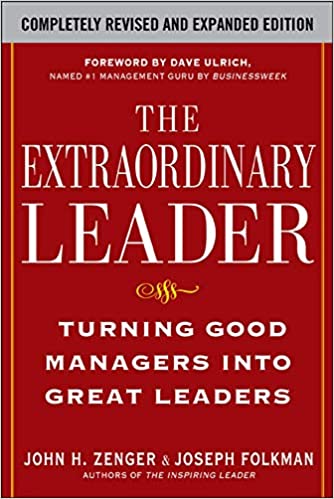The Extraordinary Leader – John H. Zenger and Joseph Folkman

“The Extraordinary Leader” is a well-known leadership book that focuses on identifying the characteristics of outstanding leaders and provides practical strategies for developing those qualities. The book is based on extensive research and features case studies and real-life examples to illustrate its concepts.
Leadership is a Skill, Not a Gift
The authors argue that contrary to popular belief, leadership is not an innate trait but rather a skill that can be developed with practice and effort. They emphasize the importance of intentional learning and feedback for developing effective leadership skills.
Emotional Intelligence Matters
Emotional intelligence is a key component of effective leadership. The authors highlight the importance of developing emotional intelligence skills, such as self-awareness, empathy, and effective communication.
Continuous Learning is Essential
The best leaders never stop learning. The authors stress the importance of continuous learning and improvement through intentional practice, feedback, and reflection.
Leadership Development is a Journey
Becoming an extraordinary leader is a journey, not a destination. The authors emphasize that leadership development is a lifelong process of self-discovery, growth, and learning. They encourage leaders to embrace the journey and enjoy the rewards of becoming an extraordinary leader.
Building Trust is Key
Trust is a fundamental aspect of effective leadership. The authors highlight the importance of building trust with team members and stakeholders through consistent and transparent communication, reliability, and integrity.
Focus on Strengths, Not Weaknesses
Zenger and Folkman advocate for a strength-based approach to leadership development. They argue that leaders should focus on developing and leveraging their existing strengths rather than trying to fix their weaknesses. This approach can lead to greater engagement, satisfaction, and performance.
Focus on Results
Results-oriented leadership is critical for success. The authors stress the importance of setting clear and challenging goals, measuring progress, and holding oneself and others accountable for achieving results.
Leadership is a Team Sport
Leadership is not a solo endeavor but a team effort. The authors emphasize the importance of building strong teams and creating a culture of collaboration, support, and accountability.
Leadership is Contextual
The authors emphasize that effective leadership is situational and contextual. They argue that the most successful leaders are able to adapt their leadership style to different situations and contexts. This requires a deep understanding of oneself, others, and the environment in which one is leading.
The Power of Feedback
Feedback is a crucial component of leadership development. The authors stress the importance of receiving regular and honest feedback to identify areas for improvement and build on existing strengths. They also provide guidance on how to give effective feedback to others.

